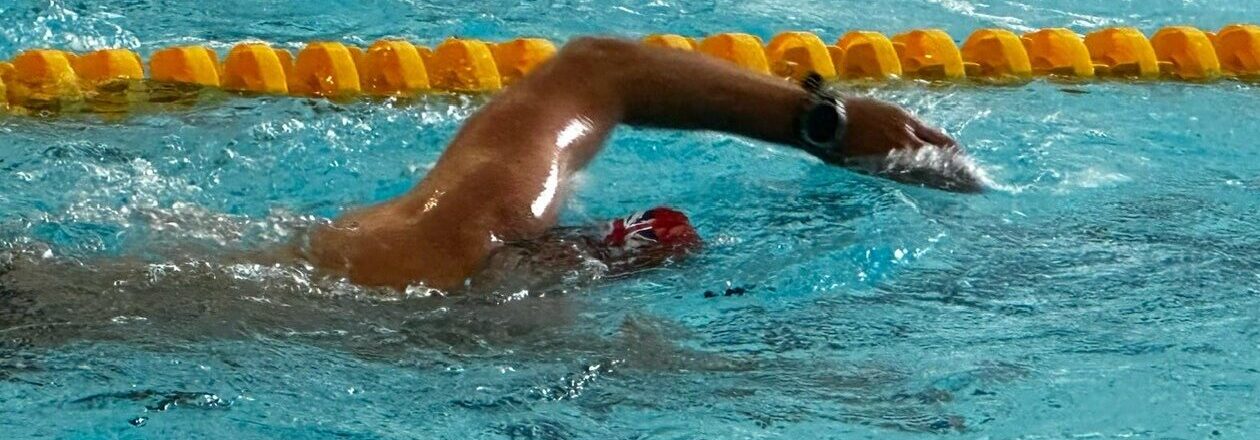
12 Aug 2025
Nick goes from struggling to walk to winning gold for TeamGB at the Transplant Games.
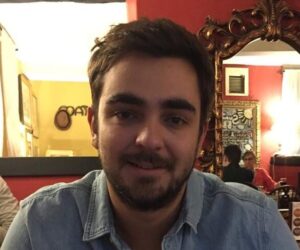
A stem cell transplant, for most who have one, represents a new start in life. For Nick Barnard, this is particularly true and in ways he didn’t predict. Having a transplant to keep his acute myeloid leukaemia in remission unexpectedly gave Nick the chance to take his life-long enthusiasm for sports to the next level. After recovering from treatment, Nick got his fitness back by swimming at his local pool. He’s now won gold at the British Transplant Games and in August 2025 will represent Team GB at the World Transplant Games in Dresden.
“I was extremely tired, I had repeated viral infections and just felt really awful, but back then in early 2018 I’d just started a new job so I kept going,” said Nick, 34, who lives near Aylesbury in Buckinghamshire. “I played in goal in competitive hockey up to a regional level, so getting bruises was familiar. But one day I saw a massive deep purple bruise on my stomach, and I couldn’t remember being hit there.
“Then came the fevers and night sweats. I’d get through the work week and go to bed at 6pm Friday night to recover from the ‘virus’ I thought I had. But I brushed it off and didn’t want to see a doctor. I’d also been playing five-a-side with colleagues, and there were some not-so-athletic members running circles round me—I was so out of breath. After one match I thought I’d strained my back and couldn’t sleep. Eventually my then-girlfriend Isabel made me call 111.
“The NHS and 111 get a lot of criticism but they were brilliant. They asked if I had a temperature, if my chest was hot, about bruising and bleeding gums—yes to all. One night at the pub, blood was pouring from my gum. Very different to the usual bit on a toothbrush.”
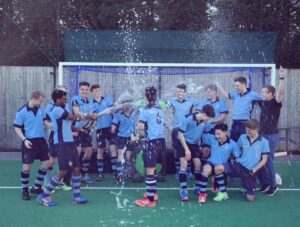
Nick played hockey before being diagnosed with leukaemia.
The 111 doctor told Nick to get to A&E at Stoke Mandeville within the hour. He didn’t know he wouldn’t leave for a month.
“I was given a blood test. Isabel was with me and called in my mum and dad. I’d said not to bother them – but luckily she didn’t listen! While Mum and Isabel went home to get pyjamas, I was just sitting with Dad when the doctors came in looking shocked and told me I had leukaemia.
“Dad and I just looked at each other. I remember actually laughing, it felt so ridiculous to hear, it was probably shock.”
Nick was immediately started on chemotherapy tablets and given a bone marrow biopsy. On 18 May 2018, the 27-year-old was diagnosed with acute myeloid leukaemia (AML). He was sent straight to a fertility clinic to leave a sperm donation, as treatment would likely cause infertility.
“That was something you don’t expect, especially when you’re feeling rough. Then they moved me to a ward and started intravenous chemo. The whole process was so fast I didn’t get the chance to process how I felt. I think I was just numb.”
The first round of chemotherapy came with sickness, hair loss and a 25kg weight loss.
“I just couldn’t eat. My mouth was so sore. The only thing I could stand was a jacket potato, which I had for every lunch and dinner for three weeks. Isabel is a teacher and took a couple of weeks off but then returned to work. Her family is in Spain and being at work helped her not feel isolated. Dad was retired, and Mum took early retirement to be with me—she was due to leave work soon anyway.
“It was hard to be stuck in one room for so long. What helped me was staying positive. It never occurred to me I might not get better. I made big efforts to keep walking when allowed to MRI or X-rays instead of being wheeled. Psychologically it made me feel less like a patient.”
At the end of his first chemo cycle, despite being in remission, Nick was told he had the FLT-3 mutation, meaning his AML would likely return without a transplant.
“That was a blow. I was alone when I was told, which was hard. I’m fairly stoic but found it easier to deal with things when people were around. In a way, caring for them helped me cope.” Nick had two more rounds of chemotherapy before the transplant, this time with different drugs which he found easier to tolerate.
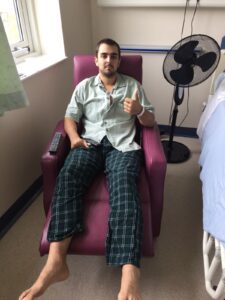
Nick during his treatment.
“My dad is a scientist and began researching drug trials, which helped him cope. He found some trials for my leukaemia led by Professor Paresh Vyas from Oxford with a drug called Mylotarg. We mentioned it to my consultant and they got me on the trial. These rounds were much easier with fewer side effects.”
A stem cell donor – a young man from Germany – was found via Anthony Nolan, and Nick had his transplant on 25 September 2018.
“The transplant itself was an anti-climax, but the ten days of conditioning chemo beforehand were the worst. At first I was fine. But then I hit my lowest point. I swelled up and looked like I’d gone 10 rounds with Mike Tyson. My mouth was so sore it felt like the tissue inside was falling off. I had to be fed intravenously and was on morphine. I had sickness, diarrhoea, and every trip to the bathroom needed a nurse I’d collapse straight back into bed.”
Nick spent seven weeks in hospital. Even at home he continued to struggle. He was then put on another trial drug, Quizartinib, to help those with the FL
T-3 mutation stay in remission.
“Professor Vyas said I’d be as weak as a kitten – getting up would be my activity for the day, and he was totally right. One day I emptied the dishwasher, and it took me 90 minutes sitting on a stool. From playing hockey three or four times a week to this, it was hugely different.
“Fortunately my employer was amazing, despite me only being there six weeks. They paid me for three months and kept the job open. We survived on one salary and paused our mortgage. I went back to work the following April, almost a year after diagnosis.”
Shortly after Nick returned to work full-time, the Covid lockdown happened. As a high-risk person, he was told to isolate again.
“It felt like being a patient again, which was hard. But I had started being more active and made sure to walk a bit more each day.”
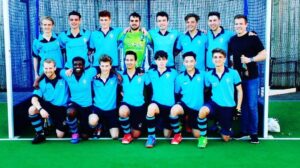
Nick playing goalie for his hockey team prior to leukaemia diagnosis.
In 2020, Isabel and Nick got engaged and married in Mallorca in 2022. By then Nick had regained his fitness but wasn’t allowed to play hockey due to injury risks. It was around that time that his doctor mentioned the Transplant Games.
“I think he understood the kind of person I am and dangled it in front of me like a carrot. I couldn’t compete in hockey anymore, but I’d swum for a club as a teenager and thought that was ideal to regain fitness. So I started swimming regularly at the local pool.”
In 2023, Nick applied for the British Transplant Games.
“I had no expectations but came away with a silver medal. So I joined a local swim team, and in the May 2024 Games won gold in 50m and 100m breaststroke. Then in September I got a letter asking me to represent Great Britain in the 2025 World Transplant Games. I was absolutely shocked and elated. I had it as a goal in my mind but never expected to get there that quickly.”
The World Transplant Games celebrate second chances at life for transplant recipients and raise awareness of organ and tissue donation. First held in 1978 in Portsmouth, the event runs 17–24 August 2025 with 17 sports, 2,500 amateur and elite athletes from up to 60 countries.
“Ironically, although I was good at hockey, I’d have been unlikely to represent my country. It’s funny how life goes.
“I also believe I benefitted from being on trial drugs and was lucky to have people around me to look into them. I’d recommend others to do this – there’s always something new being researched, and they can make a real difference to side effects and outcomes.
“I stayed positive throughout and never thought I wouldn’t make it. That helped me and those around me. The only reminder I’m left with is that my hair didn’t grow back and I’m now completely bald. But it saves a fortune on haircuts – and helps me swim faster!”
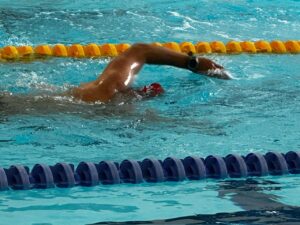
Nick swimming for Team GB.
Share your story
We want to help people tell and share the leukaemia stories that matter – stories like Nick’s and stories like yours.
Related posts
19 June 2023
Leukaemia UK research paves the way for personalised lymphoma treatment
Despite promising trials, standard treatment for diffuse large B-cell lymphoma (DLBCL) hasn’t changed in a decade. New treatment strategies for this type of blood cancer are urgently needed. Could the…
9 November 2017
Leukaemia UK is the new name for the ‘Elimination of Leukaemia Fund’
We are a leading charity making a difference to families affected by leukaemia, lymphoma, myeloma and other blood cancers.
7 November 2024
University of Southampton’s Dr Giorgia Chiodin Wins Olive Boles Innovation Award
Dr Giorgia Chiodin from the University of Southampton has been awarded the prestigious Olive Boles Innovation Award for 2024. Awarded annually to a Leukaemia UK John Goldman Fellow, this award…
29 November 2021
John Goldman Fellowship awarded to Dr Pramila Krishnamurthy
Leukaemia UK is proud to announce Dr Pramila Krishnamurthy of King’s College Hospital and King’s College London as a Leukaemia UK John Goldman Fellow co-funded by Rosetrees Trust. Dr Krishnamurthy will be using the fellowship to better understand why some leukaemia patients relapse following a stem cell transplant, and how donor lymphocyte infusion can help prevent this.